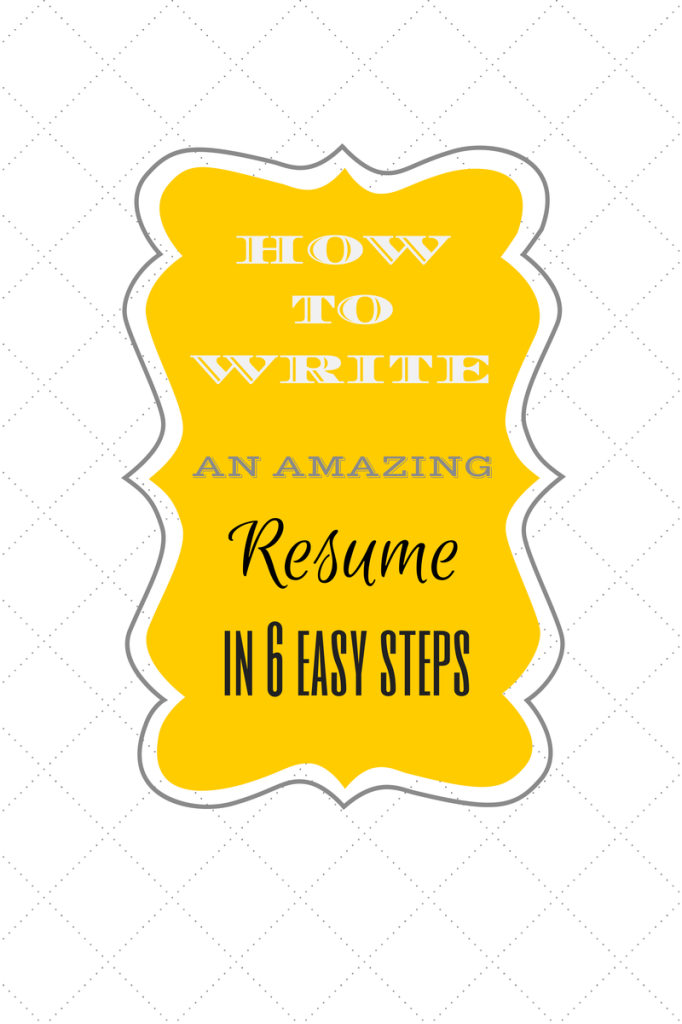How to Write a Great Resume
Whether you have a long term job, you’re a student, or you’re job searching, you need to keep an up-to-date, well written resume.
Here’s why:
If you don’t update your resume regularly, you’ll forget the things that you’ve accomplished when it comes to job searching.
Sometimes, it’s not the awards & promotions that recruiters want to see. It’s the way you organized a team, or lead a committee, or sold more than average. Trust me, I am one!
Plus, you never know when an opportunity will come up that you need to be ready for. It always happens when you least expect it. Sometimes, you just need a good resume.
1. Skills, not Tasks.
When writing your resume, you always want to focus on skills, instead of tasks. Skills are transferable – you can use them no matter what the job is. Tasks are not.
If the employer sees that you waited tables for 2 years at a local restaurant, you’ll find that they’re not so impressed.
If the same employer sees that through waiting those tables, you developed organizational skills while working as a team in a fast paced environment to produce a satisfying experience to customers, they’ll be a little more impressed.
Example:
What not to do:
Work Experience:
- Operated the cash register
- Brought food to tables
Let’s examine a good example using the same tasks, turning them into skills.
Do this instead:
Work Experience:
- Utilized organizational and technological skills to receive and process customer payments, ensuring accurate information and efficiency
- Submitted orders and delivered food to tables efficiently in order to maintain customer satisfaction, resulting in receiving the Employee of the Month award three months in a row.
As an employer, which one would you be more apt to bring in for an interview? Probably the second one.
Ideally, you should start each task with an action word, and try to incorporate some of your achievements into each work/volunteer experience section.
For instance, if you, working at the restaurant above, were awarded employee of the month because of your efficiency and quality of work, say so!
It might look like this:
- Researched ways to effectively and efficiently manage customers, resulting in customer satisfaction and the Employee of the Month award.
This is not the best example, but basically, use an action word, followed by what you accomplished, followed by the recognition.
2. Try to avoid the words “I, me, you” in resumes
The “Objective” is really the only place those words belong. This is not the biggest deal, but if used too much, they can make you look unprofessional.
3. Put your most relevant experience first.
The traditional resume has Objective, Work Experience, Education, Interests, and sometimes volunteer experience (usually in that order).
If you have more relevant volunteer experience to the position your applying for, bump it up under objectives. If you have no relevant experience because you are a new grad, bump your school learnings up under objectives.
Don’t just list your classes. The recruiter won’t care nor will they likely know what you learn in such courses. Instead, describe the skills and projects you did in those classes. For example, if you took accounting, you could say:
- Accounting: Analyzed financial statements, organized and prepared budgets, and solved any budgeting problems. Presented recommendations to instructor utilizing problem solving skills.
Once again, this was off of the top of my head and may not be the best example. I hated accounting so I don’t know if that’s what you do in class, but it shows that you learned enough to make recommendations, that you have analysis and problem solving skills, and that you can organize something. If you used Excel or another budgeting program, say so – computer skills are a must in today’s technology based business.
Don’t just list any old class – if you are applying for a Human Resources job and you have your Accounting course on there, you’re probably going to impress nobody. The only exception is if the job description calls for experience with Excel and you used Excel extensively in that class – then definitely use it.
This leads to the next point..
4. Read the Job Description. Over & Over
HR puts a ton of time into job descriptions. A properly written job description can solve problems. It can ensure you don’t hire the wrong people. It can really bring out the skills necessary. It can show who wants the job and who doesn’t.
Those people that recruiters think don’t want the jobs are the people that clearly have not read the job descriptions. We know when you have and haven’t, and here’s how to make sure it looks like you have.
Print off, or pull the job description into word. Comb through it. Read it over once, tick off each skill on the job description that you believe that you have. Read it a second time. Highlight the skills that are repeated, seem especially important, or are emphasized. If the job description says
“Must be a meticulous organizer”, then it’s probably very important to them. Highlight it.
A well written job description will have 3-5 skills that are emphasized. They also might have 7-10 skills (usually in bullet points) under the “Skills” or even “Tasks” section. Use them. Pull out the skills from these sections, evaluate whether you have them, and use them all over your resume like they’re going out of style. Seriously.
Also, if it’s a poorly written job description, it might be task based (ex: Use a cash register, sweep the floors). If so, think. If I were an employer who wanted somebody who could sweep the floor, I’d really be wanting somebody who was organized and clean. Brainstorm the skills that would go along with the task.
If there was one thing I could change in everyone’s resume writing style, it would be this. Sometimes, applicants apply for so many jobs they just don’t have time for this. But it’s what it holding you back from getting those jobs.
5. Don’t forget those interests
Employers want well-rounded employees. When writing your resume, don’t forget to include interests. If you don’t have any interests, or any room on your resume, it’s fine to leave them out, but interests and hobbies can really help develop skill too. In the case that you are well traveled, say so in your interests. This might show that you can work well with cultural diversity – important in today’s business environment.
6. Don’t go over two pages
Recruiters are busy people. They get 100’s of resume per job posting sometimes. They really don’t want to have to read a long resume – in fact, they usually stop and throw it out after two pages. Or at least don’t get to the last pages.
Use only the most relevant, current information on your resume to keep it under two pages. This actually shows a lot about your communication skills too – keep it concise!



Great tips! Almost every job I’ve had in my field, including my current one, I’ve gotten based on a recommendation (well, that and mad skillz) and not by applying and interviewing for it. This sometimes makes me moderately terrified that my resume and cover letter just SUCK and should I ever need to apply for a new job, I’ll be screwed.
Then again, I recently interviewed some candidates for a position at work, and let me tell you, that 10% guess of well-written resumes is a gross, gross overestimate. They were all awful.
Oh, a couple tips for shortening a resume. (My industry seems to really prefer one-page CVs, for some reason). Lose the objective and the references sections, even the “references available on request.” line. In the words of a former boss: “Your objective is to get the job. Period. And of course you’ll have references if asked.” I also don’t have an interests section on my resume, because there’s no room, and my previous job experience makes it pretty obvious what I’m interested in.
Thanks for the tips.
I am embarrassed to admit that I haven’t updated my resume since my graduation. I need to put these tips to good use.